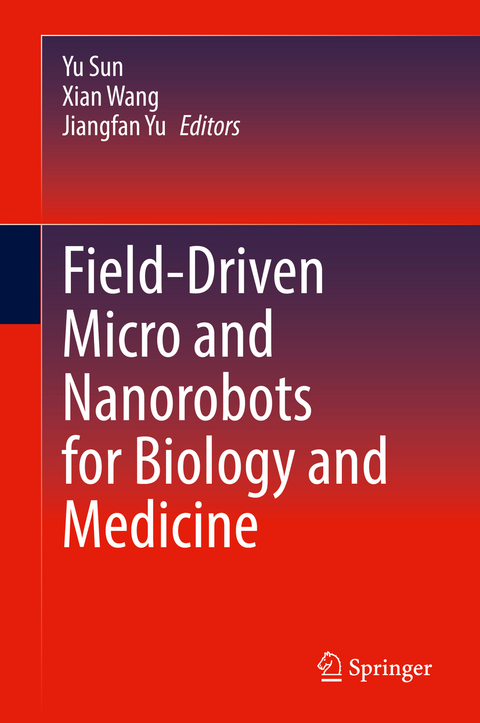
Field-Driven Micro and Nanorobots for Biology and Medicine
Springer International Publishing (Verlag)
978-3-030-80196-0 (ISBN)
This book describes the substantial progress recently made in the development of micro and nanorobotic systems, utilizing magnetic, optical, acoustic, electrical, and other actuation fields. It covers several areas of micro and nanorobotics including robotics, materials science, and biomedical engineering. Field-Driven Micro and Nanorobots for Biology and Medicine provides readers with fundamental physics at the micro and nano scales, state-of-the-art technical advances in field-driven micro and nanorobots, and applications in biological and biomedical disciplines.
lt;p>Yu Sun is a member of two national academies of Canada (Canadian Academy of Engineering; Academy of Science of the Royal Society of Canada). He is a Tier I Canada Research Chair and the Director of the University of Toronto's Robotics Institute. His Advanced Micro and Nanosystems Laboratory specializes in developing innovative technologies and instruments for manipulating and characterizing cells, molecules, and nanomaterials. He was elected Fellow of the ASME (American Society of Mechanical Engineers), IEEE, AAAS (American Association for the Advancement of Science), National Academy of Inventors (USA), and AIMBE (American Institute of Medicine and Biomedical Engineering (AIMBE) for his work on micro-nano devices and robotic systems. Among the awards he received were an NSERC E.W.R. Steacie Memorial Fellowship, an NSERC Synergy Award for Innovation, the McLean Award, and the IEEE C.C. Gotlieb Computer Award.
Xian Wang is a research fellow at the Hospital for Sick Children in Toronto. He received a B.S. degree in Engineering from Tianjin University in 2015 and his Ph.D. degree from the University of Toronto in the collaborative Ph.D. program in Mechanical Engineering and Biomedical Engineering in 2020. He has published more than 20 peer-reviewed papers in international journals, including Science Robotics, Nature Communications, PNAS, IEEE Transactions on Robotics, Biophysical Journal, and Journal of Cell Science. He received the Best Paper Award on Automation at the 2019 IEEE International Conference on Robotics and Automation (ICRA), and the Best Poster Presentation at the 2018 and 2019 University of Toronto MIE Symposiums. He has been awarded a Lap-Chee Tsui Fellowship, Ontario Graduate Fellowship and Mitacs Graduate Fellowship in Canada, a National Scholarship in China, and Milligan Graduate Fellowship at the University of Toronto.
Jiangfan Yu is an Assistant Professor at the Chinese University of Hong Kong, Shenzhen. He received his B.Eng. degree from Harbin Institute of Technology (2014), and his Ph.D. degree from the Chinese University of Hong Kong (2018). He worked as a postdoctoral fellow at the Chinese University of Hong Kong (2018 - 2019) and at the University of Toronto (2019 - 2020). Dr. Yu's research interests lie in micro/nanorobotics and medical robotics. He has made contributions to swarm control of micro/nanorobots, including their fundamental modeling, actuation strategy, motion and reconfiguration control, and biomedical applications. Since 2017, he has published more than 30 papers in international journals, including Science Robotics, Nature Communications, The International Journal of Robotics Research (IJRR), IEEE Transactions on Robotics (T-RO), IEEE/ASME Transactions on Mechatronics (TMECH), and ACS Nano. Several of his journal papers have been indexed as ISI highly cited papers, and have been highlighted in Science, Nature, and international press reports, such as CNN. Dr. Yu has won several awards, including Nature Communications Top 50 physics articles (2018), TMECH best paper award finalist (2020), CUHK Postgraduate Research Output Award (2018), Hong Kong Young Scientist Award shortlist (2018), and the First Prize of International Bionic Innovation Competition (2019). He served as a guest editor for Frontiers in Robotics and AI and Micromachines, and an associate editor for International Conference on Ubiquitous Robots 2019.
Introduction of Micro/Nano Robots.- Micro/Nano Robots Driven by Magnetic Field).- Micro/Nano Robots Driven by Acoustic Field.- Micro/Nano Robots Driven by Optical Field.- Micro/Nano Motors Driven by Electrical Field.- Micro/Nano Motors Driven by Chemical Fuels.- Bio-Hybrid Micro/Nano Robots.- Cell Sorting Using Field-Driven Micro/Nano Robots.- Mechanical Characterization on Biological Samples Using Field-Driven Micro/Nano Robots.- Mechanical Stimulation on Cell and Tissues Using Field-Driven Micro/Nano Robots.- Field-Driven Micro/Nano Robots for Tissue Engineering Applications.- Disease Diagnoses Using Field-Driven Micro/Nano Robots.- Target Delivery Using Field-Driven Micro/Nano Robots.- Minimally Invasive Surgery Using Field-Driven Micro/Nano Robots.- Perspectives and Outlook: Micro/Nano Robots to Clinics.
| Erscheinungsdatum | 27.11.2021 |
|---|---|
| Zusatzinfo | X, 421 p. 146 illus., 137 illus. in color. |
| Verlagsort | Cham |
| Sprache | englisch |
| Maße | 155 x 235 mm |
| Gewicht | 805 g |
| Themenwelt | Informatik ► Theorie / Studium ► Künstliche Intelligenz / Robotik |
| Medizin / Pharmazie ► Physiotherapie / Ergotherapie ► Orthopädie | |
| Technik | |
| Schlagworte | Bio-hybrid robots • Disease diagnoses • Mechanical characterization on biological samples • Mechanical stimulation on cell and tissues • Micro robotics • Minimally Invasive Surgery • Nanorobotics • Robotic cell sorting • Robotic propulsion • Robotics • Small-scale robotics • Tissue engineering applications |
| ISBN-10 | 3-030-80196-9 / 3030801969 |
| ISBN-13 | 978-3-030-80196-0 / 9783030801960 |
| Zustand | Neuware |
| Haben Sie eine Frage zum Produkt? |
aus dem Bereich


